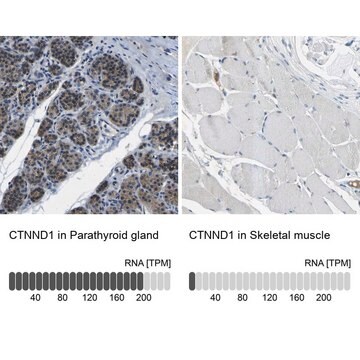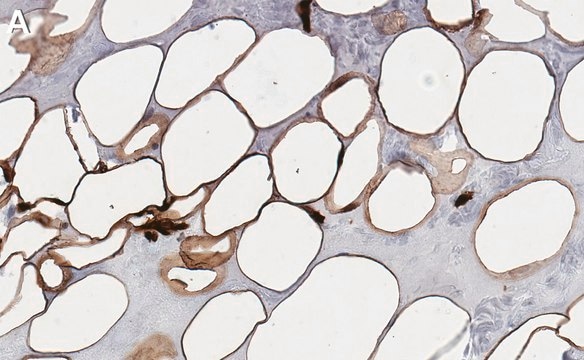ZRB2507
Anti-CTNND1/p120CTN Antibody, clone 2C22 ZooMAb® Rabbit Monoclonal

recombinant, expressed in HEK 293 cells
Synonym(s):
Cadherin-associated Src substrate (CAS), Catenin delta-1, KIAA0384, p120 catenin (p120(ctn)), p120(cas)
About This Item
Recommended Products
biological source
rabbit
Quality Level
recombinant
expressed in HEK 293 cells
conjugate
unconjugated
antibody form
purified antibody
antibody product type
primary antibodies
clone
2C22, recombinant monoclonal
description
recombinant, expressed in HEK 293 cells
product line
ZooMAb® learn more
form
lyophilized
mol wt
calculated mol wt 108.17 kDa
observed mol wt ~108 kDa
purified by
using Protein A
species reactivity
rat, human, mouse
species reactivity (predicted by homology)
nonhuman primates, monkey
packaging
antibody small pack of 25
greener alternative product characteristics
Waste Prevention
Designing Safer Chemicals
Design for Energy Efficiency
Learn more about the Principles of Green Chemistry.
enhanced validation
recombinant expression
Learn more about Antibody Enhanced Validation
sustainability
Greener Alternative Product
technique(s)
affinity binding assay: suitable
immunocytochemistry: suitable
immunohistochemistry: suitable
western blot: suitable
isotype
IgGκ
epitope sequence
C-terminal half
Protein ID accession no.
UniProt accession no.
greener alternative category
shipped in
ambient
storage temp.
2-8°C
Gene Information
human ... CTNND1(1500)
Related Categories
General description
Specificity
Immunogen
Application
Evaluated by Western Blotting in A-431 cell lysate.
Western Blotting Analysis: A 1:1,000 dilution of this antibody detected CTNND1/p120CTN protein in A431 cell lysate.
Tested Applications
Western Blotting Analysis: A 1:1,000 dilution from a representative lot detected CTNND1 in lysates from PC-12 cells, human prostate, mouse testis and rat testis.
Immunohistochemistry (Paraffin) Analysis: A 1:100 dilution from a representative lot detected CTNND1/p120CTN in human prostate tissue sections.
Immunocytochemistry Analysis: A 1:1,000 dilution from a representative lot detected CTNND1 in A-431 cells.
Affinity Binding Assay Analysis: A representative lot of this antibody bound with CTNND1/p120CTN peptide with at least one hundred thousand-fold (100,000X) higher than with non-specific control peptide.
Note: Actual optimal working dilutions must be determined by end user as specimens, and experimental conditions may vary with the end user.
Target description
Physical form
Reconstitution
Storage and Stability
Legal Information
Disclaimer
Not finding the right product?
Try our Product Selector Tool.
Storage Class Code
11 - Combustible Solids
WGK
WGK 2
Flash Point(F)
Not applicable
Flash Point(C)
Not applicable
Choose from one of the most recent versions:
Certificates of Analysis (COA)
It looks like we've run into a problem, but you can still download Certificates of Analysis from our Documents section.
If you need assistance, please contact Customer Support
Already Own This Product?
Find documentation for the products that you have recently purchased in the Document Library.
Our team of scientists has experience in all areas of research including Life Science, Material Science, Chemical Synthesis, Chromatography, Analytical and many others.
Contact Technical Service








